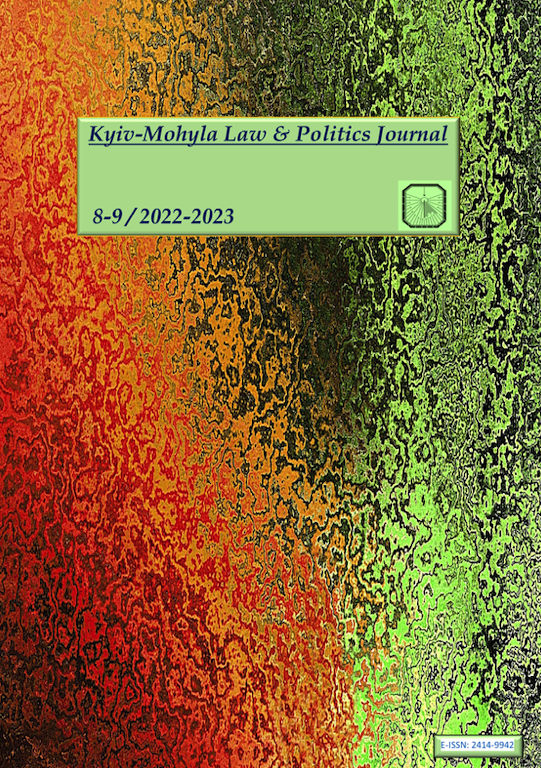Intelligence as an instrument of state power and its use in international politics
DOI:
https://doi.org/10.18523/kmlpj303156.2023-8-9.59-84Keywords:
Foreign Policy, Intelligence, Instruments of Power, Balance of Power, Security, ConflictAbstract
The article makes an attempt to theoretically substantiate why intelligence is an independent instrument of state power, its common and distinctive features with other instruments of power. The paper also provides historical examples of the use of intelligence by various states to influence the behaviour of other states, as well as various approaches used therein.
Some features of the use of the intelligence instrument of power by states in the conditions of the existence of bipolar and multipolar political systems are also highlighted in the article. It also draws attention to the incentives for the choice of intelligence as an alternative to other instruments of power in the context of the limiting impact of global collective security systems, in particular the United Nations.
References
- Bernays EL (1928): Propaganda. New York: Horace Liveright.
- Carr EH (2001): The Twenty Years' Crisis, 1919-1939. Cox M (ed). Chippenham: Palgrave Macmillan.
- Central Intelligence Agency (2007) Research aid: cryptonyms and terms in declassified CIA files Nazi War Crimes and Japanese Imperial Government Records Disclosure Acts. CIA selected documents 1941-1948. June. The U.S. National Archives and Records Administration. Available at: https://www.archives.gov/files/iwg/declassified-records/rg-263-cia- records/secondrelease-lexicon.pdf.
- Central Intelligence Agency (2015): AERODYNAMIC VOL. 5 (DEVELOPMENT AND PLANS) 0004. Nazi War Crimes and Japanese Imperial Government Records Interagency Working Group. San Francisco, CA: Internet Archive. Available at: https://ia801209.us.archive.org/6/items/AERODYNAMICVOL5DEVELOPMENTANDPLANS-0004/AERODYNAMIC%20%20%20VOL.%205%20%20%28DEVELOPMENT%20AND%20PLANS%29_0004.pdf.
- Dahl RA (1957): The concept of power. Behavioral Science 2(3).: 201- 215. DOI: doi.org/10.1002/bs.3830020303.
- Federal Law of the Russian Federation On Foreign Intelligence (1995). November 2020. Moscow: Gosudarstvennaya Duma. Available at: http://www.kremlin.ru/acts/bank/8732.
- Germany (East) Ministry for State Security (STASI) (1986): Plan for common and coordinated active measures of the intelligence organs of the MOI of the PR Bulgaria and the MFS of the GDR for 1987 and 1988. Record ID 208947. Cold War International History Project. 3 September. Washington, DC: Wilson Center Digital Archive. Available at: https://digitalarchive.wilsoncenter.org/document/208947.
- KGB (1985): Information nr.2955 [to Bulgarian State Security]". Record ID 208946. 7 September. Cold War International History Project. Washington, DC: Wilson Center Digital Archive. Available at: https://digitalarchive.wilsoncenter.org/document/208946.
- Aaron L (1976): The CIA report the president doesn’t want you to read. The Village Voice. 6 February. Available at: https://www.villagevoice.com/1976/02/16/the-cia-report-the-president-doesnt-want-youto-read/.
- Mainichi daily news (Tokyo) (2017): Former MOSSAD chief Yatom recalls failed assassination attempt on HAMAS head”. 18 August. Available at: https://mainichi.jp/english/articles/20170818/p2a/00m/0na/015000c.
- Mitrokhin VN (2002): KGB Lexicon: the Soviet Intelligence Officer’s Handbook. Abingdon: Frank Cass.
- National Security Act (1947): United States Code Title 50, §413b. 2011. Washington, DC: US Government Publishing Office. Available at: https://www.govinfo.gov/content/pkg/USCODE-2011-title50/html/USCODE- 2011-title50-chap15-subchapIII.htm
- North Atlantic Treaty Organization (2019): NATO Standard AJP-5 Allied Joint Doctrine for the Planning Of Operation. Brussels: NATO Available at: https://www.coemed.org/files/stanags/01_AJP/AJP-5_EDA_V2_E_2526.pdf.
- Nye JS (2004) Soft Power. New York: Public Affairs.
- Office of the Director of National Intelligence (2017): Background To “Assessing Russian activities and intentions in recent US elections”: The analytic process and cyber incident attribution. 6 January. Washington, DC: ODNI. Available at: https://www.dni.gov/files/documents/ICA_2017_01.pdf.
- Prokhorov D (2005): Razvedka Ot Stalina Do Putina [Intelligence from Stalin to Putin]. St. Petersburg: Neva.
- Secret Intelligence Service (2021): About us. Available at: https://www.sis.gov.uk/aboutus.html.
- Struve VV, Larin VA, Kalianov VI and Baikov IP (eds.) (1959): Arthashastra Or the Science of Politics. Translation From Sanskrit. Moscow-Leningrad: The USSR Academy of Sciences.
- Theohary CA (2020): Defense Primer: Information operations. CRS Report R45142. 15 December. Washington, DC: Congressional Research Service. Available at: https://crsreports.congress.gov/product/pdf/IF/IF10771.
- United States Department of Defense (2006): National military strategic plan for the war on terrorism. 1 February. Washington, DC: Homeland Security Digital Library. Available at: https://www.hsdl.org/?abstract&did=459916.
- United States National Security Council (1952): Statement of policy proposed by the National Security Council. NSC 136/1. The present situation in Iran. 20 November. Washington, DC: Office of the Historian, Foreign Service Institute US Department of State. Available at: https://history.state.gov/historicaldocuments/frus1951-54Iran/d147.
- Wallimann I, Tatsis NC and Zito GV (1977): On Max Weber's Definition Of Power. The Australian And New Zealand Journal Of Sociology 13 (3): 231-35. DOI: doi:10.1177/144078337701300308.
- Waltz KN (1979): Theory Of International Politics. Berkeley: Addison- Wesley Publishing Company.
- Wolfberg A and Young BA (2016) Is Intelligence An Instrument Of National Power? American Intelligence Journal 33 (1): 26-30. Available at: https://www.researchgate.net/publication/311962928_Is_Intelligence_an_Instr ument_of_National_Power.
Downloads
Published
How to Cite
Issue
Section
License
Copyright (c) 2023 Vadym Chernysh

This work is licensed under a Creative Commons Attribution 4.0 International License.
Kyiv-Mohyla Law and Politics Journal provides free access to original research without restriction barriers (i.e. subscription fees, licensing fees etc.).
Unless otherwise indicated, content is licensed under the Creative Commons Attribution 4.0 International (CC BY 4.0) license, which means you are free to:
distribute, remix, tweak, and build upon your work, even commercially
...provided that any use is made with attribution to author(s) and Kyiv-Mohyla Law and Politics Journal.
The copyright in the article or any other submission to Kyiv-Mohyla Law and Politics Journal shall remain with the author(s).
The journal allows the author(s) to hold the copyright without restrictions and will retain publishing rights without restrictions.





